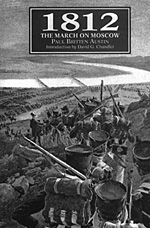
Title: 1812: The March on Moscow
Author: Paul Britten Austin
Pages: 416
Illustrations: 34 black and white, grouped on sixteen glossy pages in center folio
Maps: 4 in appendix.
Footnotes: 29 pages of paragraph length notes. Excellent.
Appendices: One graph
Bibliography: 120 author entries, predominantly memoirs, and other primary sources
Index: 12 pages, extensive
Publisher: Greenhill Books, UK/ Stackpole Books, USA.
Publication Date: 1993
Binding: Hard Cover
ISBN: 1-85367-154-1
Summary: A montage of eyewitness accounts of the epic march on Moscow. The author has drawn on over 100 first hand accounts, from French, Italian, German, Polish, and Ukrainian participants, to construct a powerful and unique telling of this incredible event. The majority of his sources have not been translated into English before, and the book does the English-speaking reader a great service.
 Done in a manner reminiscent of Anthony Brett-James, Mr. Austin patches and weaves
together a single narrative from the pieces of so many others; a difficult art to be sure. The
author, quoted in the introduction, calls his text "a word-film shot by over 100 of the
survivors." The effect is all that and more-it is a remarkable and unforgettable read.
Done in a manner reminiscent of Anthony Brett-James, Mr. Austin patches and weaves
together a single narrative from the pieces of so many others; a difficult art to be sure. The
author, quoted in the introduction, calls his text "a word-film shot by over 100 of the
survivors." The effect is all that and more-it is a remarkable and unforgettable read.
I should warn you that this book is by no means a standard military history of the 1812 campaign. For those who wish such a source, I would recommend Richard Rhein's 1812: Napoleon's Russian Campaign or George Nafziger's Napoleon's Invasion of Russia, among others. Furthermore, I think a familiarity with one of the more conventional accounts of the 1812 campaign would enhance a reader's ability to follow along with the many shifts in perspective and style that Mr. Austin's approach inevitably requires. In some ways, the nature of this book is the opposite of those other works, and, if I had my way, I would wish that more military history buffs would balance their reading with accounts such as this one. In the foreword, no less a military historian than David Chandler says:
"War, when all is said and done, is about human beings under the combined stresses in multi-variant proportions of discomfort, hunger, homesickness, boredom and danger, with occasional brief minutes of sheer elation or absolute terror thrown in to add a little 'spice' as it were."
Let me say also that Paul Britten Austin is not foremost a military historian, but rather a literary biographer, translator and novelist. A man of distinguished sensibilities, he is to be commended for displaying that rare talent in a writer, namely of making himself disappear, of letting the story speak for itself, and to let the reader hear, virtually unalloyed, the voices of the past. Any judgments to be made are left to us, and to Mr. Austin's witnesses, whose opinions are unique and whose capacities to render events are often nothing less than breathtaking (and it is refreshing for a change not to hear an author lecture us on just what Napoleon should and should not have done).
The 1812 Campaign stands as one of the most appalling disasters in history. The scale of human loss and suffering is beyond the power of the human imagination to compassionately comprehend. What struck me about this book was the character and quality of the men who told the story, their perceptions, their sufferings, their dreams, their longings, the history they witnessed and lived to tell. They speak powerfully for the many, many others whose stories we can only imagine.
Back to Empire, Eagles, & Lions Table of Contents #11
© Copyright 1995 by The Emperor's Press
